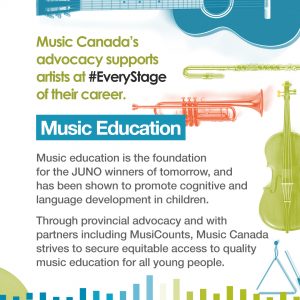 Throughout March, Music Canada has been highlighting the ways our advocacy supports artists at every stage of their career, including our work on Music Education, Music Cities, and Copyright. As we head to Vancouver for the 47th Annual JUNO Awards, we now share our final instalment of the #EveryStage series outlining how Music Canada celebrates success of Canada’s artists and the music that resonates around the world.
Throughout March, Music Canada has been highlighting the ways our advocacy supports artists at every stage of their career, including our work on Music Education, Music Cities, and Copyright. As we head to Vancouver for the 47th Annual JUNO Awards, we now share our final instalment of the #EveryStage series outlining how Music Canada celebrates success of Canada’s artists and the music that resonates around the world.
Music Canada is proud to once again return as sponsor of the JUNOS Album of the Year category, as well as the Presenting Sponsor of the Chairman’s and Welcome Reception on Friday, March 23. With our sponsorship of the award, we join music fans across the country in celebrating the works from this year’s nominees – Arcade Fire, Ruth B, Shania Twain, Johnny Reid, and Michael Bublé – and congratulate the dedicated label and production teams involved with each release.
All of this year’s nominated Album of the Year releases have been officially certified through Music Canada’s Gold/Platinum program, which was launched in 1975 to celebrate milestone sales of music in Canada. The Gold/Platinum Certification & Awards Program provides a tangible recognition of national success for artists and their teams with our unique award plaques, who are often surprised with the plaques during tour stops throughout the country.
With over 17,000 albums, singles, digital downloads, ringtones, and music videos certified over the past 44 years, the program provides a unique historical record of popular music in Canada. Over the years, the certification sales criteria for Gold and Platinum records have reacted to market conditions, and are indicative of overall trends in the music industry. For example, we updated the program’s certification criteria in 2016 to begin accepting on-demand audio streaming towards new single certifications, and again in 2017 for albums. As with past updates, the current guidelines provide a more accurate reflection of Canadian music fans’ consumption habits, and has helped reward a new generation of Canadian and international artists who utilize these new digital platforms.
The Gold/Platinum Canada-branded certification announcements and award presentation photos are shared by thousands of fans across the world on Twitter, Facebook, and Instagram to help congratulate their favourite artists’ for success in our territory. In conjunction with the program’s social media presence and updated guidelines, Music Canada launched the Gold In Canada playlist in July 2017 on Spotify and Google Play, and updates the playlist every Thursday with 50 of the latest tracks across all genres earning the coveted Gold certification. In 2018, Music Canada curated three new all-Canadian playlists from the Gold/Platinum archives – Canada Vibes, Canada Rocks The 2000s, and Forty 45s – which are now available to stream across Apple Music, Spotify, and Google Play.
https://twitter.com/GoldPlatCA/status/952956265675837441
https://twitter.com/GoldPlatCA/status/943509709767806977
Music Canada also presents two awards annually at Playback, our annual industry dialogue and celebration. In 2017, Music Canada presented the inaugural Artist Advocate Award to Toronto-based artist, label owner, and activist Miranda Mulholland, in recognition of her outstanding advocacy efforts to improve the livelihoods of music creators.
Since 2015, Music Canada has also presented the President’s Award to an individual working outside the music community who displays a deep passion for music and the people who make it. In 2017, this award was co-presented to London Music Industry Development Officer, Cory Crossman, and Chris Campbell, Director of Culture and Entertainment Tourism at Tourism London, for their incredible commitment to making London, ON, a Music City. Their efforts helped the Canadian Academy of Recording Arts & Sciences select London as the next host city for the 2019 JUNOS, which will be the first time the city will host the JUNO celebrations.


The 2018 JUNO Awards and portions JUNO Week events will stream live through CBC Music from Vancouver, BC, on Sunday, March, 25 at 8pm ET/5pm PT. Congratulations to all of this year’s nominees, and we look forward to celebrating another year of Canadian music with fans nationwide.






Music Canada